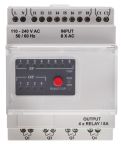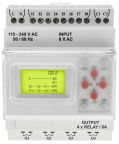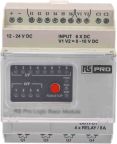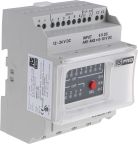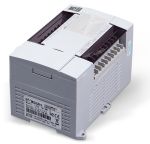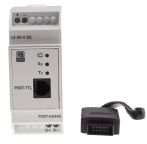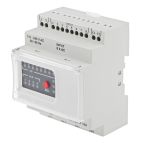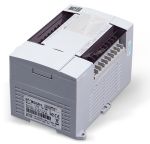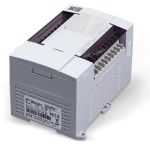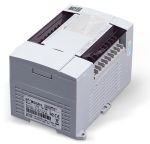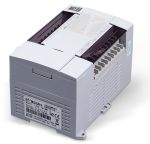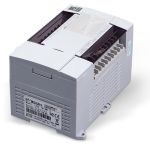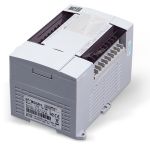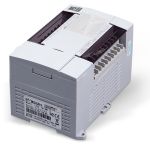PLCs - Programmable Logic Controllers
PLC stands for Programmable Logic Controller. It is a digital computer-based control system commonly used in industrial automation to monitor and control machinery or processes. A PLC is designed to withstand harsh industrial environments and is typically used to automate tasks that require precision, reliability, and flexibility. It consists of a programmable microprocessor, input and output modules, and various communication interfaces.
Typically housed in durable electrical boxes to protect from environmental hazards, PLCs are usually installed near the systems they manage to ensure efficient operation and swift response. This setup helps maintain continuity and safety in industrial applications, making PLCs essential for modern manufacturing and process control.
How Do PLCs Work?
PLCs work by executing a program or set of instructions to control and automate industrial processes. Here’s how each key function contributes to their effective operation:
- Input Acquisition: PLCs begin their operations by gathering inputs from various sources such as sensors, switches, or user inputs. These inputs represent the current conditions or states of the industrial process being controlled.
- Program Execution: Once inputs are acquired, the PLC processes them through a specific program or set of instructions. This program is custom-written by engineers to suit particular automation tasks.
- Program Logic: The core of PLC operation lies in its logic algorithms. These algorithms interpret the inputs and apply logic to determine the appropriate actions, based on predefined criteria.
- Decision Making: Based on the interpreted data and embedded logic, the PLC makes decisions on whether and how to act to control the process effectively. This step is crucial for dynamic responses to changing conditions within the system.
- Output Control: After making decisions, the PLC sends signals to various output devices, such as actuators or relays, to execute actions like starting a motor, opening a valve, or triggering alarms.
- Communication: PLCs often need to communicate with other systems or machinery. This communication occurs over networks that connect different PLCs and computer systems to synchronise complex processes.
- Monitoring and Diagnostics: An essential function of PLCs is ongoing monitoring and diagnostics. This capability allows for real-time tracking and troubleshooting of system operations, facilitating prompt maintenance and minimising downtime.
Benefits of PLCs?
- Flexibility: Provide a high degree of flexibility in terms of programming and reprogramming. They allow for easy modification and adaptation of control logic to accommodate changes in the process or system requirements without requiring hardware modifications.
- Reliability: Designed for reliable operation in harsh industrial environments. They are built to withstand extreme temperatures, vibration, electrical noise, and other challenging conditions. PLCs are known for their robustness and durability.
- Real-time Operation: Offer real-time control, enabling precise and timely response to inputs and events. This is crucial in applications that require fast and accurate control, such as high-speed manufacturing processes or critical safety systems.
- Diagnostics and Troubleshooting: PLCs provide built-in diagnostics and monitoring capabilities, allowing operators to detect faults, analyse performance, and troubleshoot issues quickly. This facilitates maintenance and minimises downtime.
- Safety Features: Many PLCs offer safety-oriented functionality, including specialised programming languages and certified safety modules. Safety PLCs ensure compliance with industry safety standards and provide features such as safety interlocks, emergency stop functions, and fault detection.
- Remote Access and Monitoring: PLCs with network connectivity allow for remote access and monitoring, enabling operators to control and monitor processes from a central location or through secure remote connections. This enhances operational efficiency and facilitates remote troubleshooting.
Types of PLCs
There are primarily two types of Programmable Logic Controllers:
Fixed/Integrated/Compact PLCs
Often referred to as Fixed I/O PLCs, these controllers have both input and output sections integrated directly into the microcontroller. This integration means that the types and quantities of inputs and outputs are predetermined by the manufacturer and cannot be expanded. These PLCs are small and ideal for applications where the control system does not require customisation or future expansion.
Modular PLCs
Contrasting with fixed PLCs, Modular PLCs offer flexibility and expandability through additional modules. This type allows for expansion in terms of I/O units and other functionalities, making it adaptable to complex systems and changing needs. Each component, including the power supply, communications, and I/O modules, is separate and must be connected to form the complete system. Modular PLCs often include rack-mounted options, where all connections are centralised within the rack, enhancing the system's organisation and scalability.
Application of PLCs
PLCs are versatile and crucial in optimising operations across multiple industries. Here are some key applications:
- Manufacturing: In manufacturing, PLCs automate complex production lines, control machinery, and streamline processes for efficiency and quality control, such as in assembling electronics or producing consumer goods.
- Power Generation and Distribution: PLCs manage and monitor electrical distribution systems, helping to balance load, control circuit breakers, and integrate renewable energy sources into the grid.
- Chemical and Petrochemical Industry: These controllers play a critical role in the precise control of mixing, chemical reactions, and batch processing, ensuring safety and compliance with industry standards.
- Water and Wastewater Treatment: PLCs aid controlling water contaminant levels, managing flow rates, and remotely operating valves that control in-process water flow, ensuring safety and compliance with health standards.
- Food and Beverage Industry: In this sector, PLCs are used for controlling food processing equipment, managing bottling and packaging operations, and ensuring consistent product quality through precise temperature and process controls.
- Automotive Industry: Automobile manufacturers employ PLCs to standardise production processes and maximise ROI. By automating routine tasks, PLCs reduce variability, increasing both product quality and production output.
- Pharmaceutical Industry: PLCs are vital in managing drug production, from precise ingredient mixing to strict monitoring of environmental conditions, ensuring compliance with health regulations.
How to Order PLCs From RS?
RS is a trusted supplier and distributor of high-quality programmable logic controllers, offering an extensive range from industry leaders like RS PRO, Mitsubishi, Omron, Schneider Electric, and Siemens. Our PLCs are designed for dependable performance and durability. They are rigorously tested to meet high standards for efficiency, robustness, and ease of integration into existing systems.
Business account customers who buy PLCs online from RS benefit from free delivery on all orders over $40 (excluding GST), with a delivery fee of $10 applied to orders under this amount. For private accounts and guest customers, delivery is complimentary for orders over $80 (excluding GST), with a $12.95 fee applicable to smaller orders.
Delivery Information for Australia
To ensure timely delivery of your PLCs, please place your orders by 5 pm AEST from Monday to Friday. We offer next working day delivery for items stocked locally, although some regional areas may experience extended delivery times. For a comprehensive overview of all our delivery services, including options like same-day delivery and consolidated shipments, please visit our delivery information page.
Popular Searches
Related links
- Omron CJ2M Series PLC CPU for Use with Programmable Logic Controller, 5 V Supply
- Schneider Electric M262 Series Logic Controller Transistor Output Digital Input
- Schneider Electric Modicon M221 Series Logic Controller Relay Output Discrete Input
- Schneider Electric Modicon M251 Series Logic Controller for Use with Modicon M251
- Omron NX102 Series PLC CPU for Use with Machine Automation Controller NX1
- WIS Portenta WIS PLC Series Series Controller for Use with PLC Accessories Relay Output,
- Schneider Electric Modicon TM5 Series Logic Controller for Use with Motion Controller, 24 V Supply
- WAGO 750-8 Series Controller 1-Input

